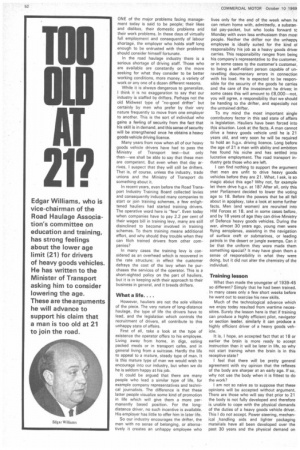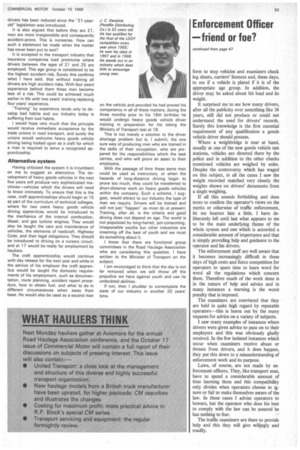Too Di AT 21?
Page 54

Page 55

If you've noticed an error in this article please click here to report it so we can fix it.
ONE of the major problems facing management today is said to be people; their likes and dislikes, their domestic problems and their work problems. In these days of virtually full employment and consequently of labour shortage, the employer who holds staff long enough to be entrusted with their problems should consider himself fortunate.
In the road haulage industry there is a serious shortage of driving staff. Those who are available are constantly on the move seeking for what they consider to be better working conditions, more money, a variety of work or any one of a dozen different reasons.
While it is always dangerous to generalize. I think it is no exaggeration to say that our industry is staffed by drifters. Perhaps not the old Midwest type of "no-good drifter" but certainly by men who prefer by their very nature frequently to move from one employer to another. This is the sort of individual who gains a feeling of security from the fact that his skill is in demand, and this sense of security will be strengthened once he obtains a heavy goods vehicle driving licence.
Many years from now when all of our heavy goods vehicle drivers have had to pass the Ministry of Transport test—but only then—we shall be able to say that these men are competent. But even when that day arrives, I suspect that they will still be drifters. That is, of course, unless the industry, trade unions and the Ministry of Transport do something about it.
In recent years, even before the Road Transport Industry Training Board collected levies and consequently induced many companies to start or join training schemes, a few enlightened hauliers had started training drivers. The operative word here is "few". Even today when companies have to pay 2.2 per cent of their wages bill in training levy, many are still disinclined to become involved in training schemes. To them training means additional effort, and why should they trouble when they can filch trained drivers from other companies?
In many cases the training levy is considered as an overhead which is recovered in the rate structure; in effect the customer defrays the cost of the levy when he purchases the services of the operator. This is a short-sighted policy on the part of hauliers, but it is in keeping with their approach to their business in general, and it breeds drifters.
What a life. . . •
However, hauliers are not the sole villains of the piece. The very nature of long-distance haulage, the type of life the drivers have to lead, and the legislation which controls the recruitment of drivers, all contribute to this unhappy state of affairs.
First of all, take a look at the type of existence the operator offers to his employee. Living away from home, in digs, eating packed meals or in transport cafes, and in general living from a suitcase. Hardly the life to appeal to a mature, steady type of man. It is this mature type of man we would wish to encourage into our industry, but when we do he is seldom happy at his job.
It could be argued that there are many people who lead a similar type of life, for example company representatives and technical journalists. The difference is that these latter people visualize some kind of promotion in life which will give them a more permanently based position. For the longdistance driver, no such incentive is available. His employer has little to offer him in later life.
So our industry encourages the drifter, the man with no sense of belonging, or alternatively it creates an unhappy employee who lives only for the end of the week when he can return home with, admittedly, a substantial pay-packet, but who looks forward tc Monday with even less enthusiasm than most people. Neither the drifter nor the unhappy employee is ideally suited for the kind of responsibility his job as a heavy goods driver carries. This responsibility ranges from being his company's representative to the customer, or in some cases to the customer's customer, to being a self-reliant person capable of unravelling documentary errors in connection with his load. He is expected to be responsible for the security of the goods he carries and the care of the investment he drives; in some cases this will amount to £8,000 not, you will agree, a responsibility that we should be handing to the drifter, and especially not the untrained drifter.
To my mind the most important single contributory factor in this sad state of affairs is legislation. Hauliers have been forced into this situation. Look at the facts. A man cannot drive a heavy goods vehicle until he is 21 years old, and very soon he will be required to hold an h.g.v. driving licence. Long before the age of 21 a man with ability and ambition has found his niche and has settled into lucrative employment. The road transport industry gets those who are left.
I can find nothing to support the argument that men are unfit to drive heavy goods vehicles before they are 21. What, I ask, is so magic about this age? Why not, for example let them drive h.g.v. at 18? After all, only this year Parliament decided to lower the voting age to 18. Before the powers that be all fall about in apoplexy, take a look at some further facts. Men (and women) are recruited into HM Forces at 18, and in some cases before, and by 18 years of age they can drive Ministry of Defence heavy goods vehicles. During the war, almost 30 years ago, young men were flying aeroplanes, assisting in the navigation of surface craft or submarines, or leading patrols in the desert or jungle swamps. Can it be that the uniform they wore made them something special? It may have given them a sense of responsibility in what they were doing, but it did not alter the chemistry of the individual.
Training lesson
What then made the youngster of 1939-45 so different? Simply that he had been trained. In many cases only a few short weeks before he went out to exercise his new skills.
Much of the technological advance which we enjoy today resulted from wartime necessities. Surely the lesson here is that if training can produce a highly efficient pilot, navigator or section leader, similarly it can produce a highly efficient driver of a heavy goods vehicle.
It is, I hope, an accepted fact that at 18 or earlier the brain is more ready to accept instruction than it will be later in life, so why not start training when the brain is in this receptive state?
I feel that there will be pretty general agreement with my opinion that the reflexes of the body are sharper at an early age. If so, why not use the body when it is fittest to do the work?
I am not so naive as to suppose that these opinions will be accepted without argument. There are those who will say that prior to 21 the body is not fully developed and therefore is unable to cope with the physical demands of the duties of a heavy goods vehicle driver. This I do not accept. Power steering, mechanical handling aids and lighter packaging materials have all been developed over the past 30 years and the physical demand on
drivers has been reduced since the -21-yearold" legislation was introduced.
It is also argued that before they are 21, men are more irresponsible and consequently accident-prone. This is nonsense. How can such a statement be made when the matter has never been put to test?
It is accepted in the transport industry that insurance companies load premiums where drivers between the ages of 21 and 25 are employed. This age group is considered to be the highest accident risk. Surely this confirms what I have said, that without training all drivers are high accident risks. With four years' experience behind them these men become less of a risk. This could be achieved much earlier in life with two years' training replacing four years' experience.
"Training" by experience tends only to develop bad habits and our industry today is suffering from bad habits.
I would hope very much that the principle would receive immediate acceptance by the trade unions in road transport, and surely the unions would welcome heavy goods vehicle driving being looked upon as a craft for which a man is required to serve a recognized apprenticeship.
Alternative system
Having criticized the system it is incumbent on me to suggest an alternative. The development of heavy goods vehicles in the next five years will produce very sophisticated machines—vehicles which the drivers will need to know intimately. To ensure that this is the case, craft apprenticeships should begin at 15 as part of the curriculum of technical colleges, where for two years heavy goods vehicle driving apprentices would be introduced to the mechanics of the internal combustion, diesel, and gas turbine engines. They would also be taught the care and maintenance of vehicles, the elements of roadcraft. Highway Code, and their legal obligations. They should be introduced to driving on a nursery circuit, and at 17 would be ready for employment by hauliers.
The craft apprenticeship would continue with day release for the next year and while in the service of his employer the craft apprentice would be taught the domestic requirements of his employment, such as documentation, route planning, accident report procedure, how to obtain fuel, and what to do in different circumstances when away from base. He would also be used as a second Man on the vehicle and provided he had proved his competency in all of these matters, during the three months prior to his 18th birthday he would undergo heavy goods vehicle driver training in preparation for his taking the Ministry of Transport test at 18.
This is not merely a solution to the driver shortage problem but is, I submit, the one sure way of producing men who are trained in the skills of their occupation, who are prepared for the responsibilities which the task carries, and who will prove an asset to their employers.
With the passage of time these same men could be used as instructors, or when the hazards of long-distance driving begin to prove too much, they could be transferred to short-distance work on heavy goods vehicles within the company. Such a scheme. I suggest, would attract to our industry the type of man we require. Drivers will be trained and will not just "happenas most do at present. Training, after all, is the criteria and good driving does not depend on age. The world is not populated by long-haired, pot-consuming, irresponsible youths but other industries are creaming off the best of youth and we must do something about it.
I know that there are functional group committees in the Road Haulage Association who are considering this question. I have written to the Minister of Transport on the subject.
I am encouraged to think that the day is not far removed when we will throw off the prejudice we have against youth and use its undoubted abilities.
If not, then I shudder to contemplate the state of our industry in another 20 years' time.
























































































































